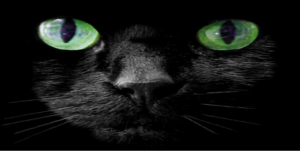By Lilia Combs

Superstitions have become a way of life. Through centuries of human existence, it has been incorporated into our genes. It has become as much a part of our living as air, water or our limbs. It is so much in our conscience that all times we involuntarily surrender ourselves to perform such rituals, in total suspension of disbelief.
Suppose you are fortunate enough to have a successful day. Even the riskiest attempts have come out exactly right. You exclaim, “This is my lucky day!” and immediately, you will almost always hear, “Knock on wood!” It is just a protective ritual. If someone challenges you about it, you will frankly admit that it is nothing but an old superstition.
“While others may make fun or attempt to debunk superstitious beliefs, if it doesn’t harm anyone in doing so, why shouldn’t you?” senior Sophie Hafter said. “Life is more fun when you believe in magic going on behind the scenes.”
What is superstition? We treat old folk beliefs as superstitions; such as lucky and unlucky days, numbers, and future events can be read from omens, that there are protective charms or that what happens can be influenced by casting spells are all called superstitions. We have discarded magic from the current worldview as we know that natural events have natural causes.
“Superstitions are believable to many people,” Sophomore, Otilli Moss said. “Having been incorporated into many cultures over the course of hundreds of years, they are so embedded in people’s lives.”
Superstitions, however, belong to the category of beliefs and ways of thinking that have been discarded because they are inconsistent with common scientific knowledge. Superstitions, used in the scientific scene, are used to debunk beliefs of other people that we do not share. Superstitions are a type of twilight world where we like to suspend our disbelief and act as if we are under the spell of magic.
Superstitions are nothing but long-standing rituals. Even in the most sophisticated mind, something happens that evokes the memory of some old folk belief. Many people always go around a ladder rather than under it. Practically everyone can remember the following observance of childhood: knocking on wood, wishing on the first star; looking at the new moon over the right shoulder, avoiding the cracks in the sidewalk. “Step on a crack, break your mother’s back”, is something you would often chant while taking large steps across the sidewalk.
“A common belief is something as simple as knocking on wood,” Senior, Bella Pivo said. “It was said that the wood nymphs would send their magic to help assist you, and the way you did that was by knocking on wood.”
Often towards the belief of primitive people, we ask if they have a religion, or if it is all their own superstitions. The point of contrast here is not between a scientific or a magical view of the world; it is what people regard as false and childish views. Superstitions are carried out through many ancient beliefs throughout history and the world today. Without the belief of superstitions, there would be no sense of magic or caution for what is the unknown.











